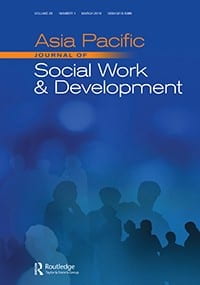
Child Development Accounts take center stage in a newly released special issue of the Asia Pacific Journal of Social Work and Development. The sweeping, seven-article issue shows the global context of the emerging asset-building policy.
“Many countries are exploring new policy innovations that encourage asset building,” said Michael Sherraden, who co-edited the issue and co-authored the introduction.
Child Development Accounts, or CDAs, are subsidized accounts that enable families to accumulate assets to invest in children’s development and life goals, such as post secondary education, home ownership, business development and retirement security.
Since Sherraden first proposed CDAs in 1991, schools, communities, states, provinces, and entire countries have launched various CDA programs and policies.
This is the vision for CDAs: They are universal, meaning everyone participates. They are progressive, meaning greater subsidies for the poor. They are lifelong, beginning at birth.
“To aid the transition from the industrial era into a globalised, information-era economy, social policies must go beyond supporting consumption: they must create opportunities for individuals to invest in long-term development,” Sherraden and co-editors Jin Huang and Li Zou write in the introduction.
Sherraden is the George Warren Brown Distinguished University Professor and founding director of the Center for Social Development (CSD) and the Next Age Institute at Washington University in St. Louis. Huang is an associate professor at Saint Louis University’s School of Social Work and a faculty director of inclusion in asset building at CSD. Zou is the international director at CSD and Next Age Institute.
Long-term vision: An account for ‘every child on the planet’
The special issue, titled “Inclusive Child Development Accounts: Toward Universality and Progressivity,” builds on the December 2017 International Symposium on Inclusion in Asset Building at the National University of Singapore (NUS). NUS is among the top universities in Asia, and is a strong partner with Washington University in the McDonnell International Scholars Academy.
In the first part, scholars highlight the core feature of “inclusiveness” of CDAs in Singapore, Israel and the United States. In the second part, scholars report on CDA policies and projects in Taiwan, Uganda, Korea and mainland China.
Lessons from their research may smooth the way for CDA policy development. For instance, it may be efficient to build CDA policy on existing policy systems. In the U.S., the SEED for Oklahoma Kids experiment is based on a state 529 college savings plan, while Israel’s CDA is closely connected to the Child Allowance program. In Singapore, newer asset-building policies for children are part of Singapore’s overall asset-building strategy.
“Experiences from all of these studies suggest that asset building can be effective in diverse cultural and social contexts,” Sherraden, Huang and Li write. But CDA design, they note, must also address challenges and goals within each country.
“The goal may be reducing child poverty and economic inequality in Taiwan and Israel, targeted poverty alleviation in mainland China, self-sufficiency of institutionalised children in Korea, or support for AIDS orphans in Uganda.”
While the special issue showcases CDA innovations globally, a “more ambitious (yet possible) vision is that innovations in CDAs may lead someday to an asset-building account for every child on the planet,” Sherraden and co-authors write.
“We can imagine a world in which every newborn begins her life with a legal identify (birth registration), a health check-up, necessary immunisations and a CDA to help build her future. The CDA would be a fully inclusive social policy that avoids funding ‘leakage’, bypasses corruption and connects capital flows directly to secure accounts of individual children all over the world.”
Inside the issue
Introduction – “Toward universal, progressive, and lifelong asset building: Introduction to the special issue on inclusive child development accounts,” by Michael Sherraden, Jin Huang and Li Zou
Part I: Inclusive Child Development Account Policies
- “Building assets from birth: Singapore’s policies,” by Vernon Loke and Michael Sherraden
- “The Saving for Every Child Program in Israel: An overview of a universal asset-building policy,” by Michal Grinstein-Weiss, Olga Kondratjeva, Stephen P. Roll, Ofir Pinto and Daniel Gottlieb
- “Impacts of child development accounts on parenting practices,” by Jin Huang, Yunju Nam, Michael Sherraden and Margaret Clancy
Part II: Child Development Account Programs and Projects
- “Policy innovation and policy realisation: The example of Children Future Education and Development Accounts in Taiwan,” by Li-Chen Cheng
- “Assessing the impact of an asset-based intervention on educational outcomes of orphaned children and adolescents: Findings from a randomised experiment in Uganda,” by Proscovia Nabunya, Phionah Namatovu, Christopher Damulira, Apollo Kivumbi, William Byansi, Miriam Mukasa, Jennifer Nattabi and Fred M. Ssewamala
- “A qualitative study on participants’ perceptions of Child Development Accounts in Korea,” by Han Chang-Keun
- “Breaking the cycle: An asset-based family intervention for poverty alleviation in China,” by Suo Deng